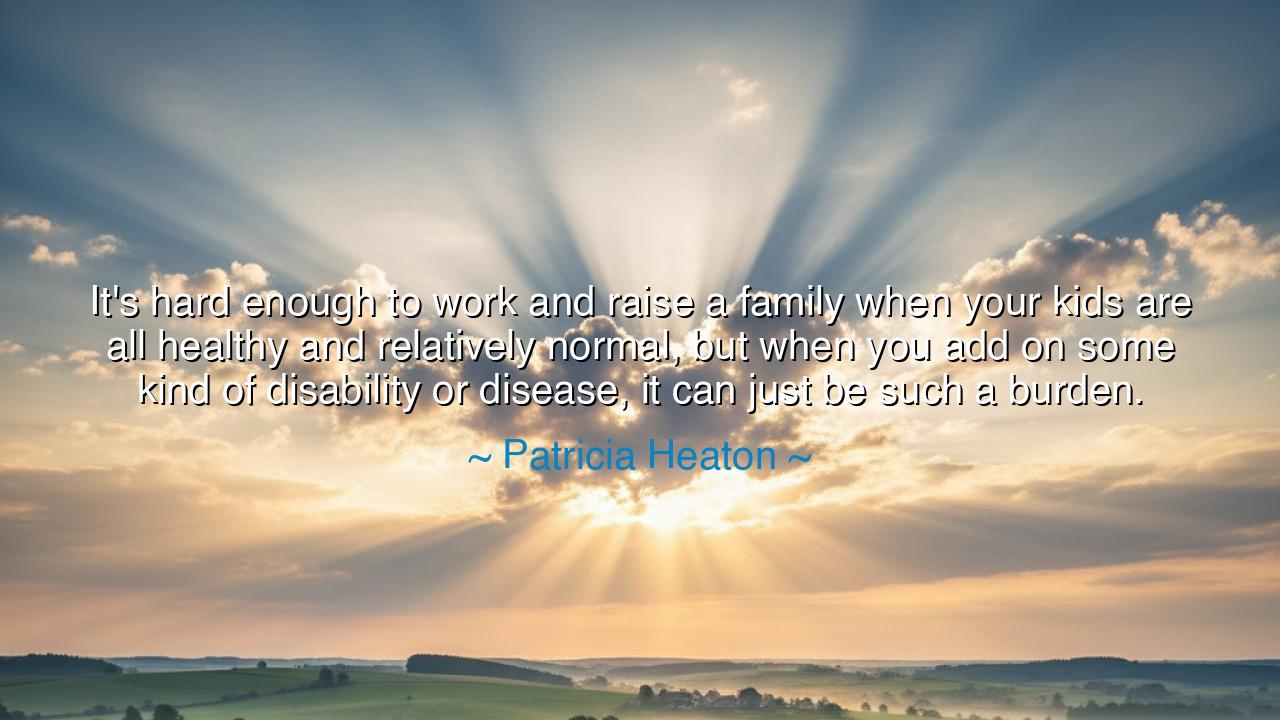
It's hard enough to work and raise a family when your kids are
It's hard enough to work and raise a family when your kids are all healthy and relatively normal, but when you add on some kind of disability or disease, it can just be such a burden.






The words of Patricia Heaton carry the weight of honesty and compassion: “It's hard enough to work and raise a family when your kids are all healthy and relatively normal, but when you add on some kind of disability or disease, it can just be such a burden.” In this statement lies both a truth and a lament. Parenting is already among the greatest labors of human life, requiring endless energy, sacrifice, and love. Yet when illness or disability is added to the path, the challenge multiplies, pressing down upon the heart with trials few can imagine. It is not a denial of love for the child—it is the recognition that the burden borne is heavier than most, and the courage required is all the greater.
The ancients often spoke of life as a road laden with stones. Every family walks this path, carrying its load, stumbling but pressing on. For some, the road is clear and the weight is steady. For others, the stones are jagged, the hills are steep, and the burdens heavier than the world would deem fair. Heaton’s words remind us of this eternal truth: that some parents are asked to bear more, not because they are weaker, but because life has placed in their care children who demand extraordinary devotion.
History offers us striking witnesses. Think of Franklin D. Roosevelt, who was stricken with polio and left paralyzed from the waist down. His mother, Sara Delano Roosevelt, devoted herself to his care and encouragement, refusing to let disability define his future. Her persistence and belief in him helped shape the man who would one day lead a nation through depression and war. Here we see Heaton’s point: the weight of disease or disability can indeed feel like a burden, yet borne with faith and love, it can also forge resilience, strength, and greatness.
Her words also remind us to honor those who labor in silence. The parent who works long hours and returns home to care for a sick or disabled child carries a double load—one that is often unseen by society. Their fatigue is deeper, their sacrifices greater, their moments of despair sharper. And yet, they rise again each morning, not because the task is light, but because their love is strong. This hidden heroism must not be ignored, for it is among the noblest forms of human courage.
The wisdom here is not only about struggle, but also about perspective. Heaton does not say that the child is the burden—she says that disease and disability add to the weight. This distinction is vital. The child remains a source of love, joy, and meaning, but the hardships of managing illness, navigating systems, and watching a beloved one suffer create a heaviness that tests the spirit. It is in this honesty that Heaton gives voice to what many parents feel but cannot say: that love does not erase difficulty, but it does give the strength to endure it.
The lesson for us is clear: we must not judge lightly the lives of parents who carry these heavier loads. Instead, we must honor them, support them, and learn from them. They show us that strength is not the absence of struggle but the ability to rise again despite it. They teach us that parenting is not only about nurturing children in times of ease, but about standing as a shield for them in times of greatest trial.
Practically, this means offering compassion, not criticism. Lend support to families carrying extra burdens—through time, resources, or simply understanding hearts. If you are such a parent, grant yourself grace; do not demand perfection, for the road you walk is already steep. Seek help without shame, and remember that every step forward, however small, is an act of triumph.
Thus, Patricia Heaton’s words echo as both truth and tribute: “It can just be such a burden.” Yes, the load is heavy, and yes, the struggle is real. Yet in carrying it, parents reveal the depths of human endurance and the boundless power of love. And though the burden may press, it is also the place where the soul is refined, where ordinary lives rise into quiet heroism, and where the next generation learns the meaning of courage.






AAdministratorAdministrator
Welcome, honored guests. Please leave a comment, we will respond soon